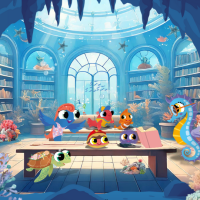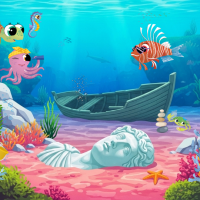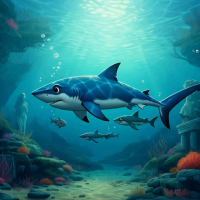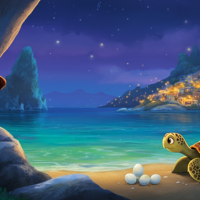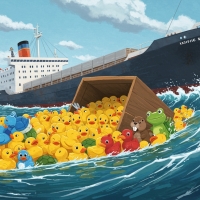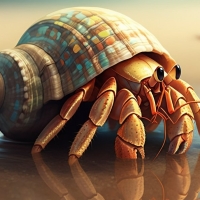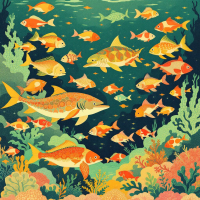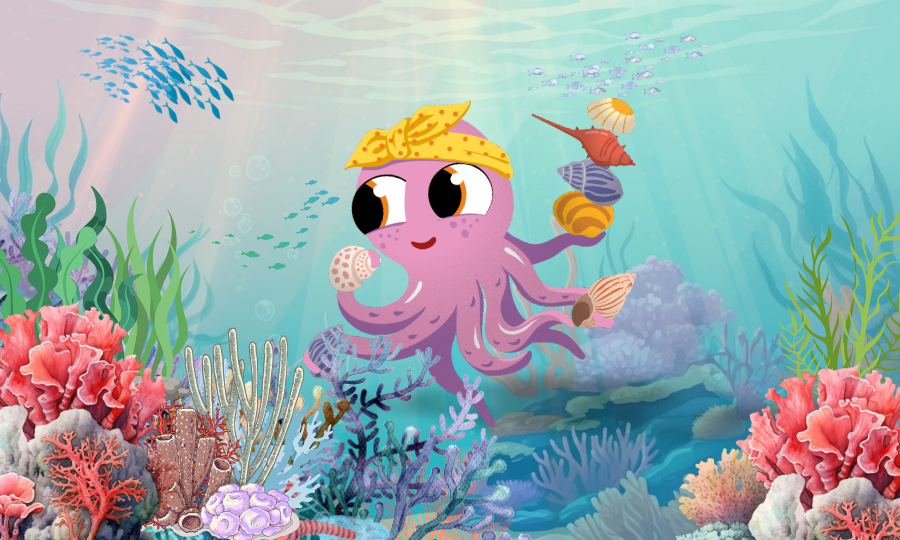
The Clever, Curly World of Octopuses!
- Sophia's Blog
- Hits: 237
Have you met Dimitra, the Octopus? She is the best friend you could have. She’s clever, caring, and always up for an adventure. I just love spending time with her!r. And she is the smartest, just like all the octopuses.
Inky, Blinky, and Brainy!
Imagine walking through a sponge garden underwater, with bright orange sponges and green seaweed all around.
Suddenly, you spot a creature the size of a cat, blending perfectly into the surroundings. It watches you with big, curious eyes, its skin folding into tiny peaks matching the orange sponge nearby.
That’s Dimitra saying hello in her own shy way. Sometimes she even reaches out one arm to gently touch, tasting the water and learning about you.
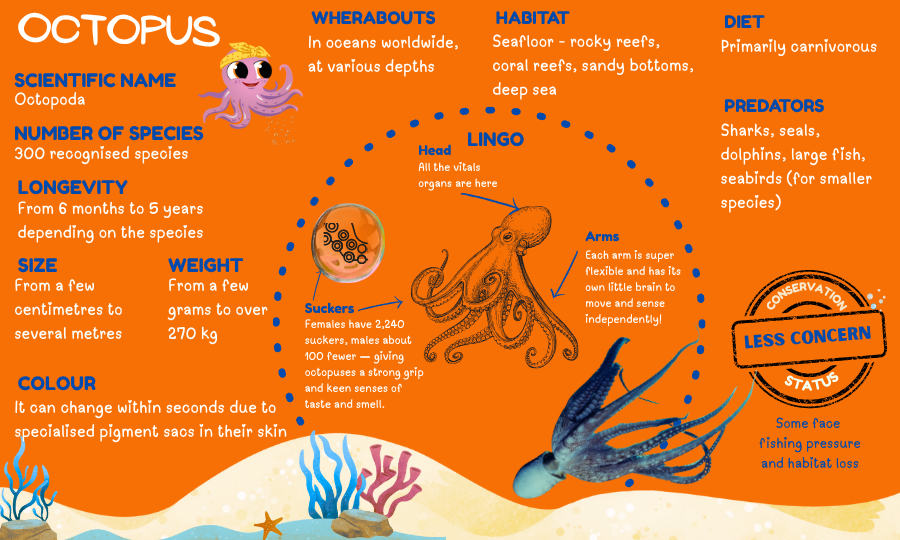
Octopuses are super cool sea creatures! They are smart, sneaky, and sometimes even a little silly. Here are some fun facts about these eight-armed wonders:
Shape-Shifters
Octopuses are masters of disguise, they use special skin cells to blend in with their surroundings. They can change their colour and even the shape of their skin to hide from enemies or sneak up on their dinner. It’s like they have magic camouflage powers!
What’s even cooler is that they can do this even though they can’t actually see colours themselves. Scientists think their eyes work like tiny prisms, helping them to focus on different colours in a very clever way!
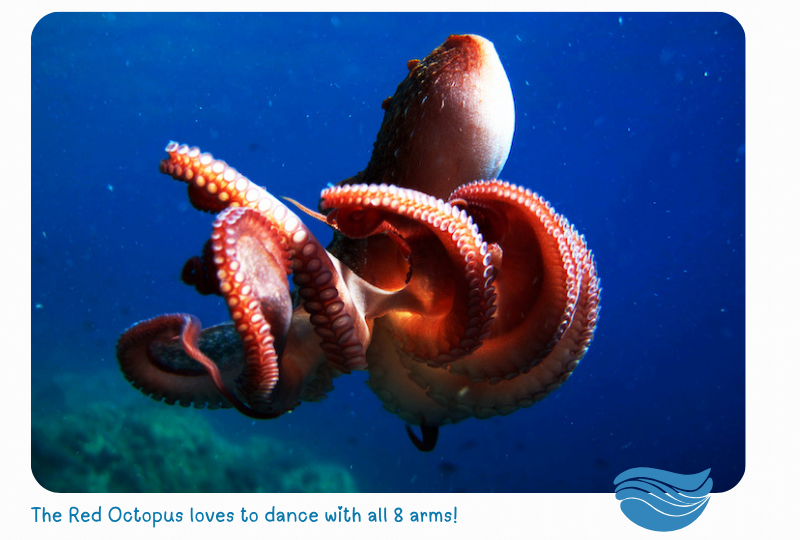
Graceful and Fast
Octopuses have more than one way to move through the water, they’re built for stealthy, flexible movements!
With their soft, bendy bodies, they can squeeze through tiny spaces and glide silently.
They often crawl along the sea floor using their eight arms, pulling themselves from rock to rock like underwater explorers.
But when they need to move quickly, they use jet propulsion, sucking in water and then pushing it out through a special tube called a siphon. This blasts them backward like a rocket!
Escape Artists
If danger is near, octopuses squirt a cloud of dark ink and zoom away! "Their ink contains chemicals that confuse predators’ eyes and noses — but don’t worry, it’s harmless to people.
Smart Cookies
Octopuses are among the smartest creatures in the sea. They can solve puzzles, open jars, remember things, and even use tools.
At aquariums, keepers play games with octopuses, giving them toys and challenges to keep their brains active, like training a clever pet.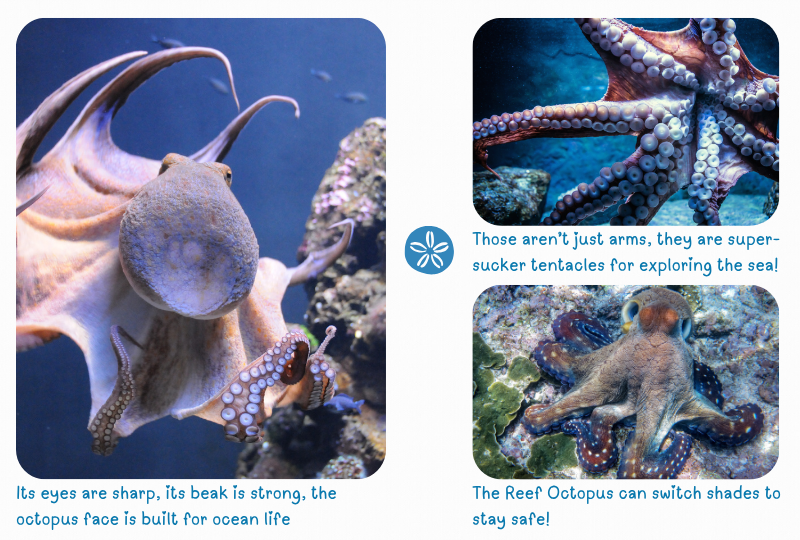 Land Walkers
Land Walkers
Some octopuses can even leave the water for a short time to explore rocks and tide pools, searching for food or escaping danger. But they need to be quick because they can only breathe through their skin for a few minutes out of water.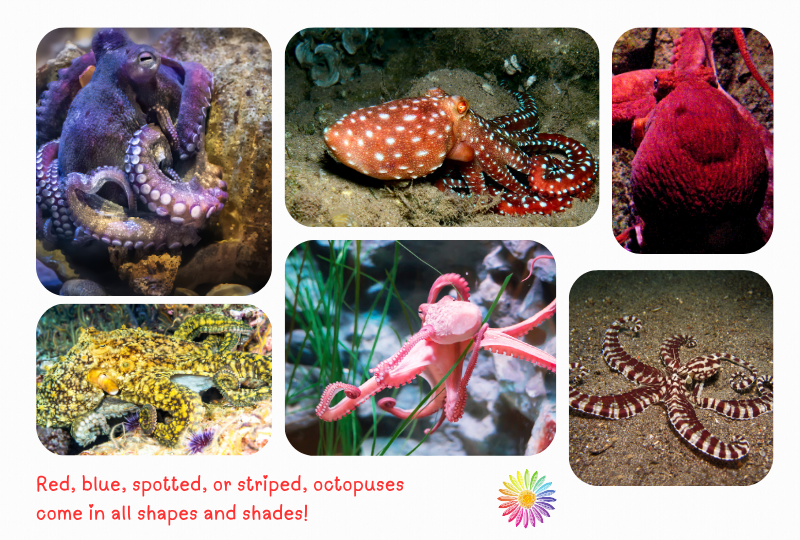
Sea Royals
Octopuses don’t have red blood like us; theirs is blue because it’s made from copper, which helps them breathe in the cold, deep sea.
And they have three hearts! Two pump blood to their gills and one pumps it to the rest of their body. But when they swim, the main heart takes a little break, which is why they prefer to crawl rather than swim all the time.
Short and Amazing Life
Most octopuses live for just one or two years. Some larger species, like the Giant Pacific Octopus, can live a little longer (sometimes up to five years) but even that is short compared to many other sea creatures.
What makes an octopus life even more interesting is how different it is for males and females, especially near the end.
When a male octopus reaches adulthood and finds a female to mate with, his journey is almost complete. After mating, his body begins to slow down. He stops eating, becomes weaker, and usually dies within a few weeks. It’s nature’s way of passing the torch to the next generation.
But the story of a female octopus is even more touching. After she lays thousands of tiny and delicate eggs, she stays close to them, guarding and caring for them. She keeps them clean by blowing water over them and makes sure no danger comes near. During this time, she doesn’t eat at all. All her strength is saved for protecting her future babies. When the eggs finally hatch, the mother’s job is done, and she gently passes away.
It’s a bittersweet story. Octopuses don’t live long lives, but they use their time wisely; they grow quickly, learn fast, explore every corner of their underwater world and help the next generation to survive. Their lives remind us that even the smallest and shortest lives can be full of wonder and courage.
Why Octopuses Are Special
Octopuses are very different from us; they don’t have bones, and their bodies move in ways we can barely imagine.
Their brains and nervous systems are unique, so scientists wonder what it’s really like to be an octopus. Could they have many little “selves” in their arms? It’s a mystery that makes these creatures even more fascinating.
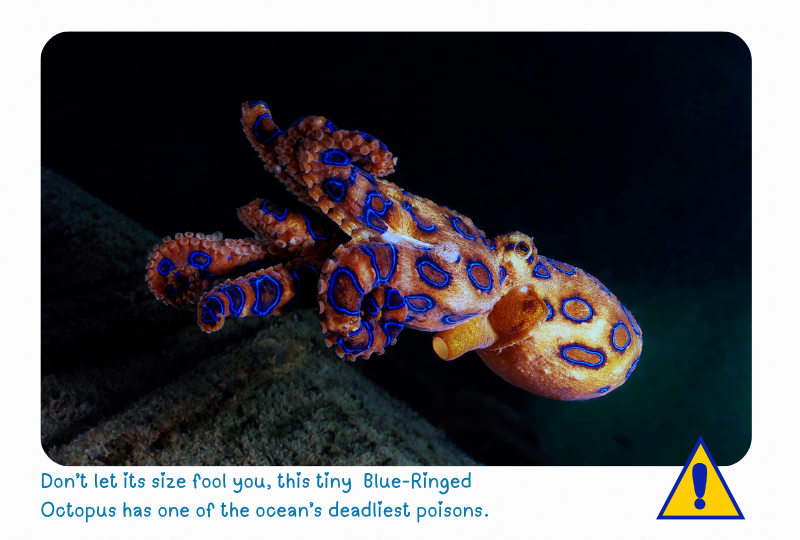
Why We Should Protect Them
Sadly, these smart and sensitive sea creatures are in trouble. Pollution, climate change, and overfishing are making their lives harder.
Their homes are getting damaged, and sometimes they even get caught in nets meant for other fish.
Some companies want to farm octopuses, and people are worried it might not be kind to such intelligent beings.
So, what can we do?
Be an Octo-Hero!
- Keep beaches and oceans clean, pick up litter (especially plastic!).
- Never touch or disturb an octopus if you see one, they’re shy and like their space.
- Say no to eating baby octopuses (some people do. YUCK!)
- Learn about the ocean and tell your friends how cool and important octopuses are!
And if you meet one underwater?
Stay calm, float gently, and watch from a distance. You might see it change colours or wave a little arm! But remember, it’s not a pet, it’s a wild, wonderful creature who deserves to be safe in its salty home.
Here are some fun octopus activities for you:
🐙 Make an octopus from an old sock. Stuff the top, cut the end into eight ‘arms’, and decorate it with buttons or drawn-on eyes. Give your octopus a name and a personality!
🐙 Learn a Rhyme: "Inky, pinky, clever chap, octopus, beware his trap!"
🐙 Imagine you’re an octopus for a day. What would you do with eight arms? Where would you go? What would you eat? Write a short story about your octopus’ adventure.
🐙 Try this experiment! Fill a balloon with water and release it. Watch how it shoots forward. That’s how an octopus moves when it needs to escape! (Do this over the sink or outside: it’s splashy!)
🐙 Pretend to be an octopus crawling across the ocean floor. Can you move like you’ve got no bones? Slither, stretch, and squeeze through imaginary rocks!
🐙 Design a poster that encourages people to keep the ocean clean for creatures like Dimitra. Use big, bold letters and lots of sea animals.
That’s the end of today’s tide-turning tale. I hope you learned something new about my amazing friend Dimitra.
Catch you on next wave!
Sophia the Seahorse

